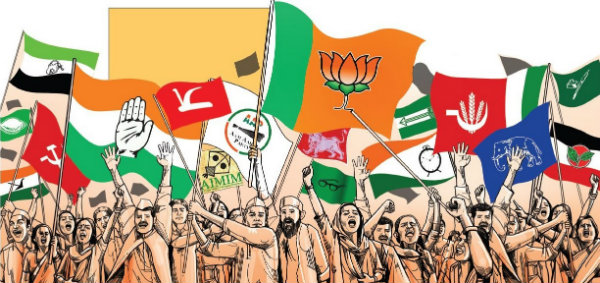It seems that Prime Minister Modi’s idea of simultaneous state and Lok Sabha elections is one step closer towards becoming a reality. In a major development, the Law Commission is set to hold consultations with major political parties in Delhi on the possibility of holding elections together at both the levels. It is going to be a two-day consultation attempting to explore how this idea can be achieved. The Commission has reportedly written to 59 state parties and 7 national parties to take part in the consultations going to take place on July 7 and 8.
This is not for the first time that the Commission has sought to interact with the political parties in order to find out whether simultaneous Vidhan Sabha and Lok Sabha elections are viable. The Law Commission had prepared a “working paper” on holding one election for legislative assemblies and the Lok Sabha. However, none of the political parties had responded to the working paper. The working paper has suggested holding the Lok Sabha elections and assembly elections simultaneously in two phases beginning 2019 and the second phase will take place in 2024. The states included in phase I are those where elections are due by 2021 whereas the second phase includes states where the terms of assemblies will have to be extended in order to hold simultaneous elections. It includes Delhi, Uttar Pradesh, Gujarat, Karnataka, and Punjab.
In accordance with a suggestion, the working paper also stated that a no confidence motion must be followed by a confidence motion. This is to ensure that if the opposition does not have the requisite numbers to form an alternative government, the sitting government is not removed. In order to bring about a proper legal framework for executing the historic reform, the working paper has also suggested appropriate amendments to the Constitution of India and the Representation of People Act. This is to make provision for shortening or extending the tenure of legislative assemblies so that simultaneous elections can be held.
The issues created by the present model of separate elections leading to frequent polls are not hidden from anyone. It not only leads to wasteful expenditure of taxpayers’ money but also forces the governments to take populist measures when elections are around the corner. It is a known fact that in the current model of back to back elections, all governments invariably remain in election mode leading to populist measures. The only solution to these issues is ‘One Nation’ One Poll’. A BJP study had disclosed that huge expenditure was incurred in 2009 and 2014 general elections with Rs. 1,115 crore and Rs 3,870 crore being spent respectively. According to government statistics, general elections require huge mobilisation of personnel. For the 16th Lok Sabha elections, around 10 million personnel were pressed into service across 9,30,000 polling stations. Moreover, 1,349 companies of the central security forces were deployed. This multiplies several times with the holding of frequent assembly elections across 31 states (including union territories, Delhi and Puducherry). NITI Aayog has also come down heavily on the present model of frequent elections in its report. It cited not only the avoidable diversion of administrative resources and personnel but also shed light on how it creates a prolific atmosphere for religion and caste conflicts.
Apart from this, with the states and Lok Sabha going to elections simultaneously every five years, political parties across the country will have to spend on canvassing only once in five years leading to an obvious reduction in election expenditure. This will reduce the dependence on money and muscle power, thereby helping India get rid of several disruptions connected to money-driven electoral politics.
This move by the Law Commission has come as a shot in the arm for Modi government. Prime Minister Modi has been strongly pushing for this reform and it seems that details about how we move into this regime are going to be finalised pretty soon by the Law Commission. This will be the biggest electoral reform the country has witnessed till date.




























